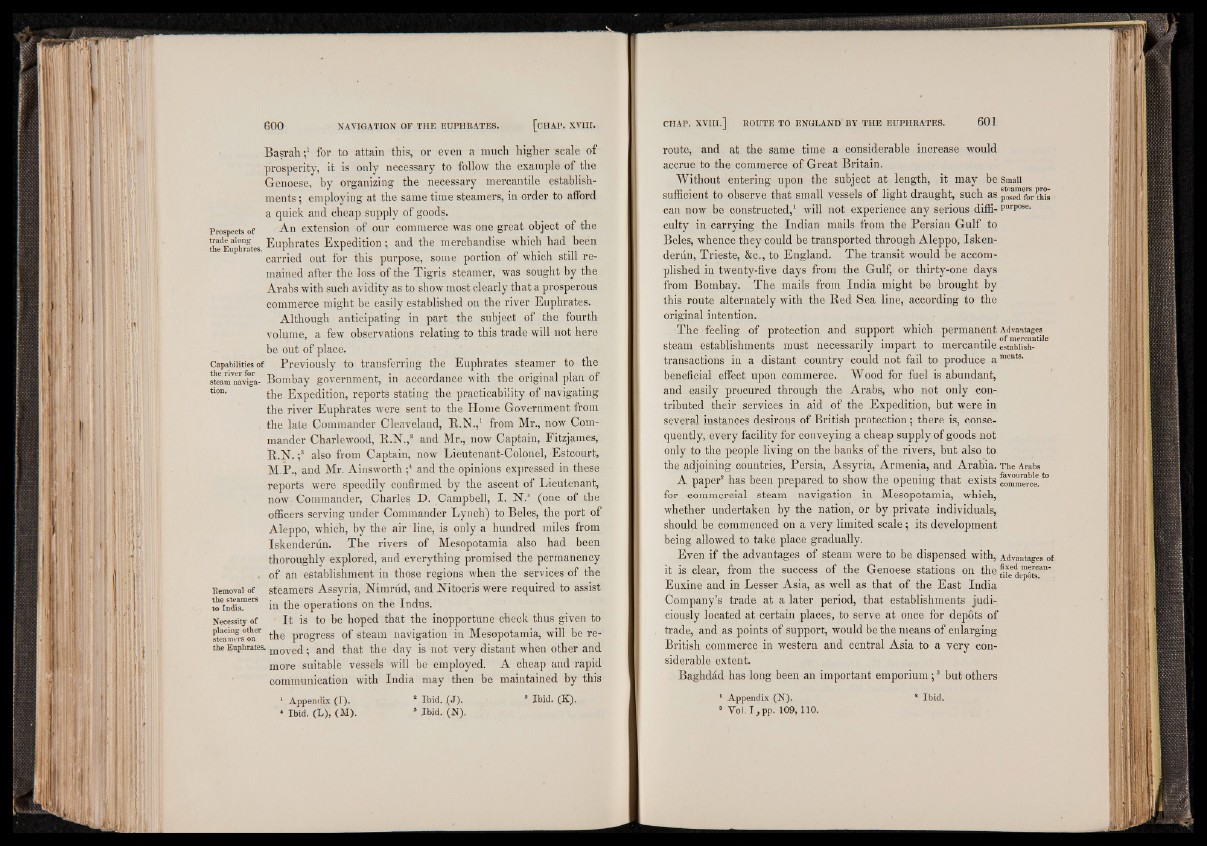
Basrah;1 for to attain this, or even a much higher scale of
prosperity, it is only necessary to follow the example of the
Genoese, by organizing the necessary mercantile establishments
; employing at the same time steamers, in order to afford
a quick and cheap supply of goods.
Prospects of An extension of our commerce was one great object of the
the Euphrates Euphrates Expedition; and the merchandise which had been
carried out for this purpose, some portion of which still remained
after the loss of the Tigris steamer, was sought by the
Arabs with such avidity as to show most clearly that a prosperous
commerce might be easily established on the river Euphrates.
Although anticipating in part the subject of the fourth
volume, a few observations relating to this trade will not here
be out of place.
Capabilities of Previously to transferring the Euphrates steamer to the
steam^aviga- Bombay government, in accordance with the original plan of
tlon‘ the Expedition, reports stating the practicability of navigating
the river Euphrates were sent to the Home Government from
. the late Commander Cleaveland, R.N.,1 from Mr., now Commander
Charlewood, R.N.,8 and Mr., now Captain, Fitzjames,
R.N. ;3 also from Captain, now Lieutenant-Colonel, Estcourt,
M.P., and Mr. Ainsworth ;4 and the opinions expressed in these
reports were speedily confirmed by the ascent of Lieutenant,
now Commander, Charles D. Campbell, I. N.5 (one of the
officers serving under Commander Lynch) to Beles, the port of
Aleppo, which, by the air line, is only a hundred miles from
Iskenderun. The rivers of Mesopotamia also had been
thoroughly explored, and everything promised the permanency
, of an establishment in those regions when the services of the
Removal of steamers Assyria, Nimrud, and Nitocris were required to assist
w*ind?amerS in the operations on the Indus.
Necessity of It is to be hoped that the inopportune check thus given to
steamers’oner the progress of steam navigation in Mesopotamia, will be re-
the Euphrates. move(j . an(j that the day is not very distant when other and
more suitable vessels will be employed. A cheap and rapid
communication with India may then be maintained by this
1 Appendix (I). ! Ibid. (J). * Ibid. (K).
‘ Ibid. (L), (M). * Ibid. (N).
route, and at the same time a considerable increase would
accrue to the commerce of Great Britain.
Without entering upon the subject at length, it may be Small
sufficient to observe that small vessels of light draught, such as posed f o r S
can now be constructed,1 will not experience any serious diffi- PurP°se-
culty in carrying the Indian mails from the Persian Gulf to
Beles, whence they could be transported through Aleppo, Iskenderun,
Trieste, &c., to England. The transit would be accomplished
in twenty-five days from the Gulf, or thirty-one days
from Bombay. The mails from India might be brought by
this route alternately with the Red Sea line, according to the
original intention.
The feeling of protection and support which permanent Advantages
, , *i • i , «I of mercantile steam establishments must necessarily impart to mercantile establish-
transactions in a distant country could not fail to produce a ments-
beneficial effect upon commerce. Wood for fuel is abundant,
and easily procured through the Arabs, who not only contributed
their services in aid of the Expedition, but were in
several instances desirous of British protection; there is, consequently,
every facility for conveying a cheap supply of goods not
only to the people living on the banks of the rivers, but also to
the adjoining countries, Persia, Assyria, Armenia, and Arabia. The Arabs
A paper2 has been prepared to show the opening that exists t0
for commercial steam navigation in Mesopotamia, which,
whether undertaken by the nation, or by private individuals,
should be commenced on a very limited scale; its development
being allowed to take place gradually.
Even if the advantages of steam were to be dispensed with, Advantages of
it is clear, from the success of the Genoese stations on the
Euxine and in Lesser Asia, as well as that of the East India
Company’s trade at a later period, that establishments judiciously
located at certain places, to serve at once for depots of
trade, and as points of support, would be the means of enlarging
British commerce in western and central Asia to a very considerable
extent.
Baghdad has long been an important emporium ;3 but- others
1 Appendix (N).
8 Vol. I , pp. 109,110.
8 Ibid.